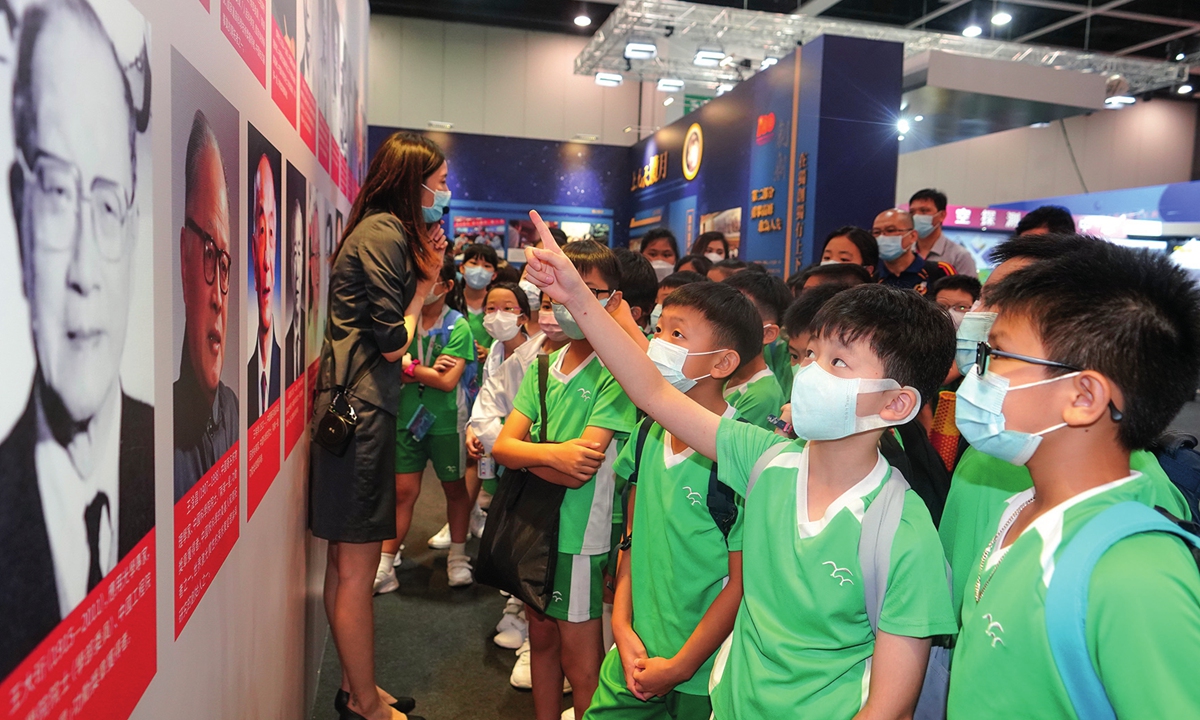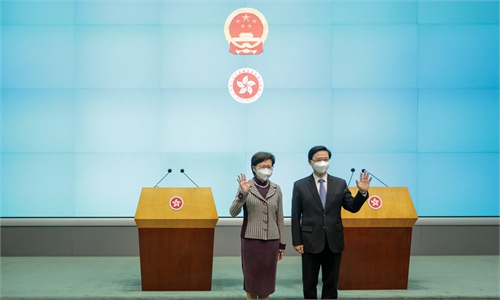HK introduces textbooks for Citizenship, expected to resolve much criticized education problem

Primary school students visit an exhibition showcasing China's scientific achievements in the past 100 years at the Hong Kong Convention and Exhibition Center on July 7, 2021. Photo: IC
On Monday, the Hong Kong Education Bureau (EDB) announced the first batch of textbooks applicable to the subject of Citizenship and Social Development in Hong Kong, with six sets of textbooks from five publishers selected.
With designated textbooks and a detailed syllabus issued by the EDB, some teachers will no longer be able to convey their wrong and poisonous political views to students when teaching this course. Such a situation, previously much-criticized by the Hong Kong education community, will be changed, a textbook reviewer told the Global Times.
The predecessor of Citizenship and Social Development (Citizenship), known as Liberal Studies, a course that existed in Hong Kong for a long time, was once much criticized. According to media reports, many people found content in Liberal Studies that incited hatred among citizens and vilified the government. Many teachers even directly imparted students their poisonous political views in the classroom.
Citizenship, a subject modified from the controversial Liberal Studies, was introduced in the fall semester of 2021, but there had been no officially designated textbook. The chaos involved with the Liberal Studies subject is expected to change with the publication of the designated textbook and syllabus of Citizenship.
Tang Fei, one of the editors and reviewers of two textbooks published by the Hong Kong Educational Publishing Co, believes that this will no longer be the case that instructors convey poisonous political views detrimental to national security in teaching.
"Citizenship is more similar to traditional subjects, with clearer knowledge points and so on," Tang, also a member of the Legislative Council of the Hong Kong Special Administrative Region (HKSAR) and vice chairman of the Hong Kong Federation of Education Workers, told the Global Times on Tuesday. "With the reference materials from the Education Bureau, there will be no need for school teachers to bring in too much other content."
The EDB has also attached great importance to the training of civics teachers, often sending people directly to schools to conduct training, Tang said.
After the end of the social unrest in 2019, Hong Kong has gradually moved into a stable and positive atmosphere. There have been repeated calls from the education sector for reforms that focus on patriotic education.
"It is necessary for schools to teach students to think positively and to love their nation," the head of the Hong Kong EDB said on Monday.
According to the syllabus, the Citizenship curriculum is divided into three sections - Hong Kong under "one country, two systems," China since reform and opening-up, and the interconnected contemporary world. Students are also required to participate in a study tour to the Chinese mainland.
The subject was established to allow students to build a broad knowledge base through the study of topics about Hong Kong, the country and the contemporary world, and to develop a national identity as well as have a global perspective, according to the EDB.
Tang said that the textbooks have passed the internal review, but the final validation has to be carried out by the bureau.
Since the materials released by the bureau provide very clear guidelines, it is unlikely that there are any major problems with the publisher's materials, Tang said.
In Hong Kong, publishing textbooks is a commercial activity. The compilation and publication of civics textbooks does not necessarily mean that all schools and teachers have to use the designated books to teach a subject. Schools and teachers still retain the right to compile and use teaching materials independently, the Global Times has learned.
The syllabus issued by the Education Bureau also gives them trustworthy guidelines for teaching Citizenship.
For example, the syllabus lists some key learning points, including the origin of the Hong Kong issue, the history of the city's return to the motherland, the legal basis of "one country, two systems" and the Basic Law, and the significance of safeguarding national security.
The syllabus requires students to be able to understand the constitutional basis of the HKSAR and its relationship with the country, to identify with national identity, to have a global perspective, to appreciate and pass on Chinese culture, and to maintain a respectful attitude toward different cultures after taking the course.
Tang pointed out that compared with the publisher's textbooks, the reference materials publicly released by the EDB can meet the needs of schools and teachers.
A test for Citizenship subject will be included in the Hong Kong Diploma of Secondary Education starting in 2024.

